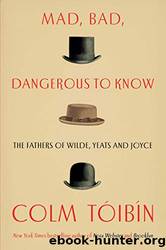Mad, Bad, Dangerous to KnowThe Fathers of Wilde, Yeats and Joyce by Colm Toibin

Author:Colm Toibin [Toibin, Colm]
Language: eng
Format: epub
Amazon: B07CMP158X
Publisher: Scribner
Published: 2018-10-30T00:00:00+00:00
THE TWO TENORS: JAMES JOYCE AND HIS FATHER
In his book Yeats: The Man and the Masks, Richard Ellmann quotes Ivan Karamazov: âWho doesnât desire his fatherâs death?â Ellmann wrote:
From the Urals to Donegal the theme recurs, in Turgenev, in Samuel Butler, in Gosse. It is especially prominent in Ireland. George Moore, in his Confessions of a Young Man, blatantly proclaims his sense of liberation and relief when his father died. Synge makes an attempted parricide the theme of his The Playboy of the Western World; James Joyce describes in Ulysses how Stephen Dedalus, disowning his own parent, searches for another father . . . Yeats, after handling the subject in an unpublished play written in 1884, returns to it in 1892 in a poem âThe Death of Cuchulain,â turns the same story into a play in 1903, makes two translations of Oedipus Rex, the first in 1912, the second in 1927, and writes another play involving parricide, Purgatory, shortly before his death.
In his work, James Joyce sought to re-create his father, reimagine him, fully invoke him, live in his world, while at the same time making sure that, from the age of twenty-two, with the exception of a few short visits to Dublin, he did not see him much. Since his fatherâs presence loomed so large in his Dublin, he would go into exile not only to escape the city of his birth but so that both Dublin and the man who had begotten him could move into shadow.
Just as Oscar Wilde began to become himself in the very year after his fatherâs death, and John B. Yeats managed, figuratively, to kill his son by going into exile, so too James Joyce managed to kill his father by leaving him to his fate in Dublin, seeking, in his fatherâs absence, not only to forge the uncreated conscience of his race but to find shape for the experience of his father, to resurrect him, to offer life to what had become shadow.
In this world of sons then, fathers become ghosts and shadows and fictions. They live in memories and letters, becoming more complex, fulfilling their sonsâ needs as artists, standing out of the way. As Stephen Dedalus in Ulysses says: âA father . . . is a necessary evil.â And later in the same speech: âPaternity may be a legal fiction. Who is the father of any son that any son should love him or he any son?â
But Joyceâs relationship to his father was more complex than either Wildeâs or Yeatsâs. In My Brotherâs Keeper, Stanislaus Joyce muses on his brotherâs relationship to his parents: âEvery man who has known the torment of thought attaches himself spiritually to one or the other of his parents . . . in the case of an author the elective affinity strongly influences his artistic production.â In the case of his brother, he wrote, the attachment was to his father.
Stanislaus Joyce makes a distinction between literature and life:
In Ulysses Simon Dedalus, for whom my father
Download
This site does not store any files on its server. We only index and link to content provided by other sites. Please contact the content providers to delete copyright contents if any and email us, we'll remove relevant links or contents immediately.
The Hating Game by Sally Thorne(19219)
The Universe of Us by Lang Leav(15063)
Sad Girls by Lang Leav(14399)
The Lover by Duras Marguerite(7888)
The Rosie Project by Graeme Simsion(6371)
Smoke & Mirrors by Michael Faudet(6180)
Big Little Lies by Liane Moriarty(5782)
The Shadow Of The Wind by Carlos Ruiz Zafón(5680)
The Poppy War by R. F. Kuang(5677)
An Echo of Things to Come by James Islington(4844)
Memories by Lang Leav(4794)
What Alice Forgot by Liane Moriarty(4623)
From Sand and Ash by Amy Harmon(4496)
The Poetry of Pablo Neruda by Pablo Neruda(4089)
The Tattooist of Auschwitz by Heather Morris(3837)
Ficciones by Jorge Luis Borges(3623)
Guild Hunters Novels 1-4 by Nalini Singh(3460)
The Rosie Effect by Graeme Simsion(3457)
THE ONE YOU CANNOT HAVE by Shenoy Preeti(3365)
